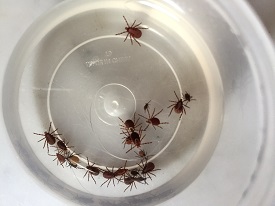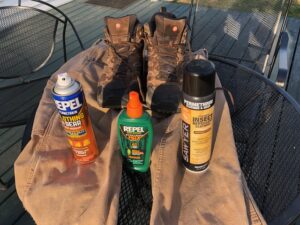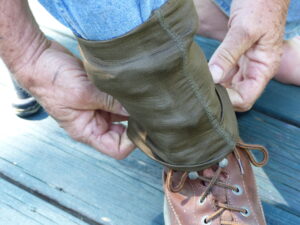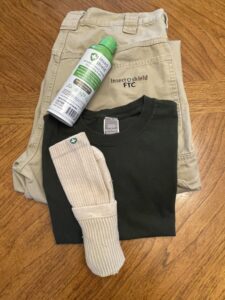A “Hard Knock Life”
A tick’s life is hard. I’m hungry. I am a tick and I’ve been waiting a week for a juicy raccoon, dog, or wild turkey to walk by. Even a mouse would be welcome.
So far, no luck. I know a tick’s best bet for grabbing a passing animal is the “questing” position, so I’ve been hanging on to a branch with both pairs of my hind legs. My front pair of legs sticks out into the path ready to grab the fur or feathers of a passing animal. So far, no animal. Patience is hard and I’m hungry.
Larval Luck
I was luckier last year when I was a larva. I was hungry then, too, but the wait was short. A big, furry animal humans call a dog ambled by. Even though I only had six legs then I was able to grab a hold, and the rest was easy. I crawled around exploring under the fur until I found a spot with soft thin skin, dug in, and chowed down. Boy was that blood tasty! It was so nutritious that I left my host to grow and graduate. I’m now a tick nymph, complete with eight legs, but I need more blood to transform into an adult.
I’m still hungry. As I sit waiting, I admire the mosquitoes and flies that buzz by over my perch. They don’t need to be patient but can fly and search for a blood-rich victim. I can’t fly or jump, so all I can do is patiently wait until something walks by. I hope that’s soon because many of my fellow ticks starve.
Attracted to Carbon Dioxide and Moisture
What’s this? I sense a bubble of carbon dioxide and moisture. Might be the breath of an animal. Now I feel the vibration of footsteps. Must be a big animal. My front legs are outstretched in anticipation and I’m not disappointed.
I grab hold of a strange animal. It’s tall with only two legs. No hair. No feathers. Just some sort of covering over thin skin. No chance of biting through it, but I got a good grip on that covering and started climbing using all of my eight legs. Soon I was under what humans call pants and kept exploring and climbing. Bingo, I found a nice moist spot where my blood dinner was just beneath thin skin. I got ready to feast.
Then something happened. I should be happy with a meal so close at hand. Instead, I felt sick. My legs wouldn’t hold on and I dropped to the ground lifeless.
About Ticks
Pity the poor tick the above. Well, maybe not. It’s hard to pity an animal that can spread disease and discomfort. Ticks usually feed on mammals, birds, and even reptiles but if none come around, human blood suits them just fine.
Ticks are effective disease spreaders because of their relatively long life which can extend for two or three years and their habit of eating a blood meal during different life stages. This enables them to bite one animal carrying a disease in its blood and inject it into a different animal during a later feeding.
Seriously Avoiding Ticks
At Winding Pathways, we take ticks seriously. Rich has had Lyme disease twice, fortunately successfully cured by strong antibiotics. Other people are not as lucky and experience long-term symptoms. And, Lyme is not the only disease ticks spread.
Understanding ticks and taking precautions reduces the odds a person will be bitten and contract a disease from them.
How ticks Operate
Ticks are ambush hunters. As the tick describes above, they wait for a victim to pass within grabbing distance of their front legs. Often ticks walk around on their victim for several hours before they dig through the skin and help themselves to a blood meal.
In order to contract a tick-borne disease a victim must be bitten, so a walking tick won’t transmit illness.
Reduce Your Odds
We often explore the woods, work in our yard and garden, and generally spend time in tick country. Here are precautions we take that reduce the odds of a tick bite:
- We spray our outdoor clothes and shoes with permethrin. It lasts for several washings and kills ticks. The hapless tick described above fell victim to this chemical.
- We often tuck our pants legs into our socks, sprayed with permethrin, to make it hard for any tick that gets on our socks or pants to get under them.
- After returning to the house, we disrobe and shower after we have checked for ticks. They prefer moist dark body areas so we especially check those places. Clothing goes into the washer.
- We watch for symptoms of Lyme Disease, especially a rash and fatigue. If they appear we call our physician immediately.
Promising Product
A few years ago, Rich was so determined to prevent another Lyme Disease incident that he invested in socks, pants, and shirts from Insect Shield. The company infuses its clothing with permethrin that, they claim, is effective for at least 70 washings.
Does this chemical work? Is Insect Shield clothing worth buying? Well, since wearing it Rich hasn’t found a tick on him and he’s been free of Lyme Disease. That’s not a scientific verdict but it’s good enough for him to keep wearing the clothes.
- Tiny ticks can cause problems, so we go prepared in nature.
- Pants, boots, varied sprays can reduce odds of picking up ticks
- gaiters with tick guard helps repel ticks.
- Pants, shirts, and socks infused with permethrin appear to keep ticks off.
Disclaimer
Rich purchased his Insect Shield clothing at the retail price. He’s still testing them but they seem to work. Winding Pathways was not paid for this blog.






I really liked the article and the advice. Lyme Disease seems to be the most
on people’s minds, but I can assure you people suffer from what is termed
alpha gal caused by the Rocky Mountain Spotted Tick. It took several years
before the medical profession was able to pull together all my symptoms and
discover this awful allergy. Before that I would become violently ill.
I cannot eat any four legged meat for a long time…years. A friend told me it’s
a molecule in the fat.
So now In this house we have had the best time finding numerous recipes that
I can eat. If we don’t like a new
found recipe, out it goes. Because beef, etc., has risen in cost, that has given us
an excuse to eat shrimp and lobster. How’s that!